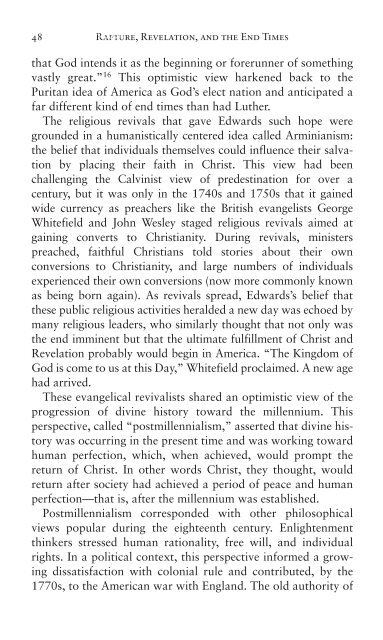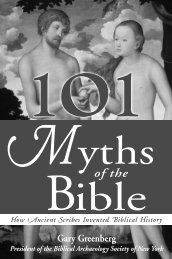Rapture, Revelation, and the End Times - Conscious Evolution TV
Rapture, Revelation, and the End Times - Conscious Evolution TV
Rapture, Revelation, and the End Times - Conscious Evolution TV
You also want an ePaper? Increase the reach of your titles
YUMPU automatically turns print PDFs into web optimized ePapers that Google loves.
48robin-bobin <strong>Rapture</strong>, <strong>Revelation</strong>, <strong>and</strong> <strong>the</strong> <strong>End</strong> <strong>Times</strong>that God intends it as <strong>the</strong> beginning or forerunner of somethingvastly great.” 16 This optimistic view harkened back to <strong>the</strong>Puritan idea of America as God’s elect nation <strong>and</strong> anticipated afar different kind of end times than had Lu<strong>the</strong>r.The religious revivals that gave Edwards such hope weregrounded in a humanistically centered idea called Arminianism:<strong>the</strong> belief that individuals <strong>the</strong>mselves could influence <strong>the</strong>ir salvationby placing <strong>the</strong>ir faith in Christ. This view had beenchallenging <strong>the</strong> Calvinist view of predestination for over acentury, but it was only in <strong>the</strong> 1740s <strong>and</strong> 1750s that it gainedwide currency as preachers like <strong>the</strong> British evangelists GeorgeWhitefield <strong>and</strong> John Wesley staged religious revivals aimed atgaining converts to Christianity. During revivals, ministerspreached, faithful Christians told stories about <strong>the</strong>ir ownconversions to Christianity, <strong>and</strong> large numbers of individualsexperienced <strong>the</strong>ir own conversions (now more commonly knownas being born again). As revivals spread, Edwards’s belief that<strong>the</strong>se public religious activities heralded a new day was echoed bymany religious leaders, who similarly thought that not only was<strong>the</strong> end imminent but that <strong>the</strong> ultimate fulfillment of Christ <strong>and</strong><strong>Revelation</strong> probably would begin in America. “The Kingdom ofGod is come to us at this Day,” Whitefield proclaimed. A new agehad arrived.These evangelical revivalists shared an optimistic view of <strong>the</strong>progression of divine history toward <strong>the</strong> millennium. Thisperspective, called “postmillennialism,” asserted that divine historywas occurring in <strong>the</strong> present time <strong>and</strong> was working towardhuman perfection, which, when achieved, would prompt <strong>the</strong>return of Christ. In o<strong>the</strong>r words Christ, <strong>the</strong>y thought, wouldreturn after society had achieved a period of peace <strong>and</strong> humanperfection—that is, after <strong>the</strong> millennium was established.Postmillennialism corresponded with o<strong>the</strong>r philosophicalviews popular during <strong>the</strong> eighteenth century. Enlightenmentthinkers stressed human rationality, free will, <strong>and</strong> individualrights. In a political context, this perspective informed a growingdissatisfaction with colonial rule <strong>and</strong> contributed, by <strong>the</strong>1770s, to <strong>the</strong> American war with Engl<strong>and</strong>. The old authority ofrobin-bobin





